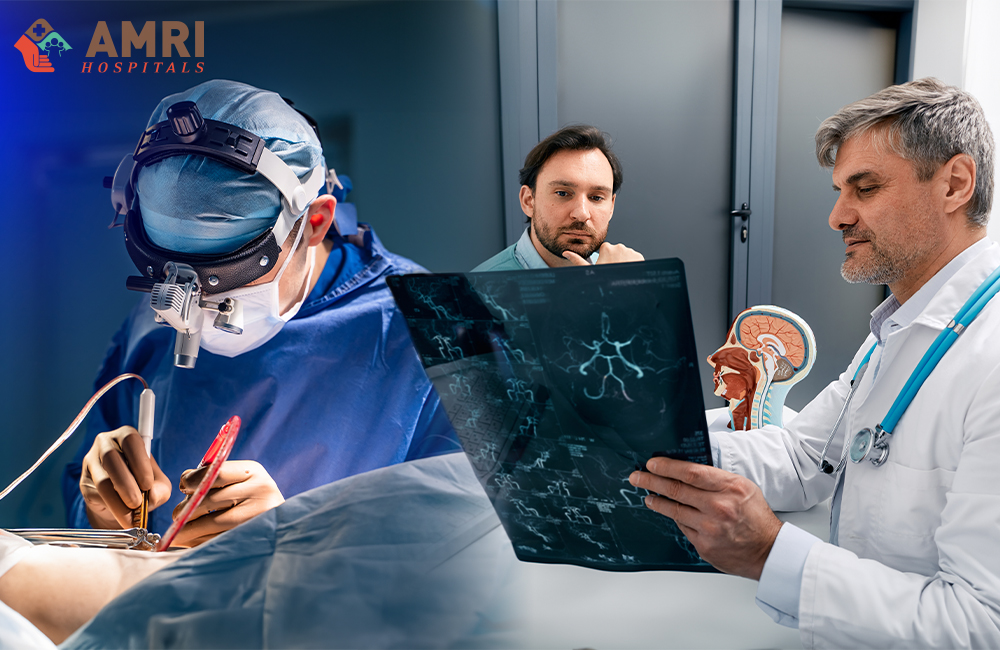What’s the Difference Between a Neurosurgeon & Neurologist?
Are you curious about the difference between a neurosurgeon and a neurologist? Well, you're definitely not alone! These two terms are often confused even by medical professionals, and it's easy to see why. But don't worry; I'm here to shed some light on this fascinating topic. Join me on this journey of exploration as we delve into the unique roles, qualifications, and specialties of top neurosurgeon in Bhubaneswar.
Neurosurgeons: The Masters of Brain and Spine Surgery
- Neurosurgeons are the surgical maestros of the nervous system. They're like the brain's architects, fixing structural issues.
- Think of them as the "cutting-edge" experts – they perform surgeries on the brain, spine, and peripheral nerves.
- Neurosurgeons diagnose and treat conditions like brain tumors, herniated discs, aneurysms, and trauma.
- They're the ones you turn to when a surgical intervention is required to correct neurological problems.
Education and Training: What Makes a Neurosurgeon?
- To become a neurosurgeon, one must complete medical school, typically taking 4 years.
- After that, they undertake a rigorous residency program that lasts 7-8 years, focusing exclusively on neurosurgery.
- It's not uncommon for neurosurgeons to pursue additional fellowship training to specialize further.
- You can be sure that when you meet a neurosurgeon, they have an impressive educational background and years of hands-on experience under their belt.
Neurologists: The Brain's Detectives
- Neurologists are like Sherlock Holmes but for the nervous system. They investigate, diagnose, and manage neurological conditions.
- While they don't perform surgery, they play a crucial role in determining whether surgery is needed, working closely with neurosurgeons.
- Neurologists deal with conditions like epilepsy, multiple sclerosis, Parkinson's disease, and migraines.
- They rely heavily on diagnostic tests and detailed patient histories to unravel the mysteries of neurological disorders.
Education and Training: The Path to Becoming a Neurologist
- Neurologists follow a similar educational path as neurosurgeons by completing medical school.
- After that, they undertake a residency program specializing in neurology, which typically takes 3-4 years.
- Just like neurosurgeons, some neurologists pursue fellowships to gain expertise in specific areas of neurology.
- The critical difference is that neurologists do not undergo surgical training, focusing instead on non-invasive treatments.
When to See a Neurosurgeon: Red Flags
- Severe head injuries or brain trauma that require surgery.
- Complex brain tumors that need surgical removal.
- Spinal cord injuries and conditions like herniated discs that necessitate surgical intervention.
- Intracranial bleeding or aneurysms that demand immediate attention.
- Neurosurgeons are the go-to experts when it's a matter of life and death or preserving vital neurological function.
When to See a Neurologist: Detecting and Managing Neurological Disorders
- Persistent headaches, migraines, or chronic pain.
- Epilepsy or seizures that need ongoing management.
- Movement disorders like Parkinson's disease or dystonia.
- Memory issues, dizziness, or unexplained changes in behavior.
- Neurologists are the detectives who investigate and manage long-term neurological conditions.
The Collaborative Approach: Neurosurgeons and Neurologists Working Together
- It's essential to understand that neurosurgeons and neurologists often work hand in hand.
- They consult each other to determine the best course of action for a patient.
- Neurologists provide the necessary diagnostic groundwork before neurosurgeons step in for surgical solutions.
- This collaboration ensures comprehensive care for patients with neurological issues.
Meet the Best Neurosurgeon in Bhubaneswar: Dr. Amit Jaiswal
- Dr. Amit Jaiswal is a highly skilled top neurosurgeon in Bhubaneswar and a minimally invasive spine surgeon with over 23 years of experience.
- He is known for his outstanding work and commitment to his patients. Dr. Jaiswal organizes departmental academic activities and performs brain and spinal surgeries in the elective theatre list.
- He has received awards and recognition for his contribution to the field of Neurosurgery, showcasing his dedication and hard work towards clinical research and high-quality patient care.
So, there you have it – the difference between a neurosurgeon and a neurologist. Neurosurgeons are the surgical wizards who perform brain and spine surgeries, while neurologists are the detectives who diagnose and manage neurological conditions without surgery. Remember, it's not about one being better than the other; rather, it's about their distinct roles in providing holistic care.
If you ever find yourself in need of the best neurosurgeon in Bhubaneswar, Dr. Amit Jaiswal is the name to trust. With his expertise and compassionate care, he ensures that you're in safe hands when facing neurological challenges.
So, the next time someone asks you about the difference between these two medical specialists, you'll be ready to enlighten them with your newfound knowledge. Until then, stay curious, stay informed, and take care of your brain and nervous system!
Also, Read this: The Amazing Growth of Cosmetic & Plastic Surgery in India




Comments
Post a Comment